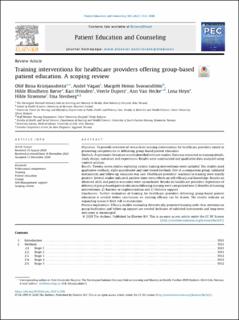| dc.contributor.author | Kristjansdottir, Olöf Birna | |
| dc.contributor.author | Vågan, André | |
| dc.contributor.author | Svavarsdóttir, Margrét Hrönn | |
| dc.contributor.author | Børve, Hilde | |
| dc.contributor.author | Hvinden, Kari | |
| dc.contributor.author | Duprez, Veerle | |
| dc.contributor.author | Hecke, Ann | |
| dc.contributor.author | Heyn, Lena | |
| dc.contributor.author | Strømme, Hilde | |
| dc.contributor.author | Stenberg, Una | |
| dc.date.accessioned | 2021-05-18T08:22:46Z | |
| dc.date.available | 2021-05-18T08:22:46Z | |
| dc.date.created | 2021-01-21T11:13:39Z | |
| dc.date.issued | 2020 | |
| dc.identifier.citation | Kristjansdottir, O. B., Vågan, A., Svavarsdóttir, M. H., Børve, H. B., Hvinden, K., Duprez, V., Van Hecke, A., Heyn, L., Strømme, H., & Stenberg, U. (2021). Training interventions for healthcare providers offering group-based patient education. A scoping review. Patient Education and Counseling, 104(5), 1030-1048. | en_US |
| dc.identifier.issn | 0738-3991 | |
| dc.identifier.uri | https://hdl.handle.net/11250/2755363 | |
| dc.description.abstract | Objectives: To provide overview of research on training interventions for healthcare providers aimed at promoting competencies in delivering group-based patient education.
Methods: A systematic literature search identified relevant studies. Data was extracted on training details, study design, outcomes and experiences. Results were summarized and qualitative data analyzed using content analysis.
Results: Twenty-seven studies exploring various training interventions were included. Ten studies used qualitative methods, eight quantitative and nine mixed methods. Use of a comparison group, validated instruments and follow-up measures was rare. Healthcare providers’ reactions to training were mostly positive. Several studies indicated positive short-term effects on self-efficacy and knowledge. Results on observed skills and patient outcomes were inconclusive. Results on healthcare providers’ experience of delivery of group-based patient education following training were categorized into 1) Benefits of training interventions, 2) Barriers to implementation and 3) Delivery support.
Conclusions:Further evaluation of training for healthcare providers delivering group-based patient education is needed before conclusions on training efficacy can be drawn. The results indicate an expanding research field still in maturation.
Practice implications: Efficacy studies evaluating theoretically grounded training with clear attention on group facilitation and follow-up support are needed. Inclusion of validated instruments and long-term outcomes is encouraged. | en_US |
| dc.language.iso | eng | en_US |
| dc.rights | Navngivelse 4.0 Internasjonal | * |
| dc.rights.uri | http://creativecommons.org/licenses/by/4.0/deed.no | * |
| dc.title | Training interventions for healthcare providers offering group-based patient education. A scoping review | en_US |
| dc.type | Peer reviewed | en_US |
| dc.type | Journal article | en_US |
| dc.description.version | publishedVersion | en_US |
| dc.rights.holder | © 2020 The Authors. Published by Elsevier B.V. | en_US |
| dc.source.pagenumber | 1030-1048 | en_US |
| dc.source.volume | 104 | en_US |
| dc.source.journal | Patient Education and Counseling | en_US |
| dc.source.issue | 5 | en_US |
| dc.identifier.doi | https://doi.org/10.1016/j.pec.2020.12.006 | |
| dc.identifier.cristin | 1876394 | |
| cristin.ispublished | true | |
| cristin.fulltext | postprint | |
| cristin.qualitycode | 2 | |

